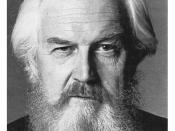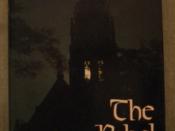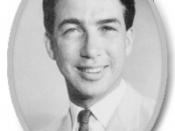In Fifth Business, Robertson Davies uses this quote to reveal the concepts of ones identity. As the child grows up, its immediate task is to create an identity for itself. It experiences different areas of life repeatedly - politics (of the family), religious beliefs (of the family), sexuality (both its own and the parents), and social relationships. These different experiences generate different beliefs, which may or may not be harmonious with each other. For example, its political beliefs may orientate around power, its sexual beliefs may orientate on fear, and its religious beliefs around guilt. The child creates its identity by the way that it learns to put value on its systems of belief. In effect, an identity is an ideology, or a system of beliefs where some are valued more than others. When a child has a happy upbringing, any belief is likely to be harmonious with the other beliefs.
On this basis the child can construct a stable identity. Conversely, a child who experiences fear and anxiety during its early childhood the beliefs generated in that area are not harmonious with the child's beliefs in other areas of its life. Its identity is potentially unstable.
Dunstable Ramsay and Percy Boyd Staunton not only change their lifestyles and mannerism to reflect their desired identities, but they also go so far as to change their names in a feeble attempt to escape their humble beginnings in Deptford. Dunny is the first to change his name, falling in love with his rehabilitation nurse, Diana. She renames him after St. Dunstan, a person that is 'Mad about learning, terribly stiff, stern and scowly, and an absolute wizard at withstanding temptation.' (Davies' 93). Dunstable accepts the new name and views it as a new opportunity to change himself, to model his life...



Good
Good description of the novel.
0 out of 1 people found this comment useful.